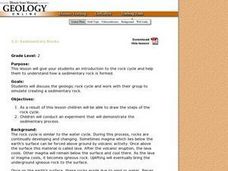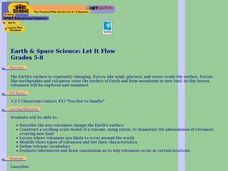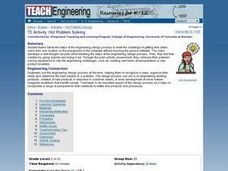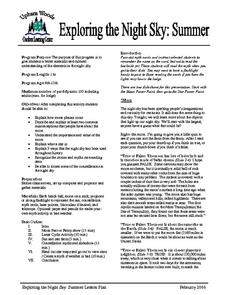Curated OER
Rocking Rock Review
The three types of rocks are the focus of this earth science PowerPoint. Young scientists can review the composition of these types of rocks and see the ways they are formed. For example, sedimentary rocks are formed when tiny grains of...
Curated OER
Word Pair Analogies 6 (high-advanced level)
Linking words together in an analogy really deepens one's understanding of the word at hand. Use the example provided to guide your advanced English speakers (both native and non-native) in this analogy practice. More than likely, your...
Curated OER
Practica de pronunciación y ortografía: la, le, li, lo, lu
Everyone benefits from some pronunciation practice! This worksheet focuses on the syllable combinations la, le, li, lo, and lu. Have your language learners pronounce each word as they fill in the missing syllable combination.
Curated OER
What Kind of Volcano Is This?
In this volcano learning exercise, students are given five pictures of volcanoes and descriptions of each. They determine what type of volcano each is and how they determined their answers.
Curated OER
2.2: Sedimentary Rocks
Second graders discuss the geologic rock cycle and work with their group to simulate creating a sedimentary rock. They conduct an experiment that demonstrates the sedimentary process and draw the steps of the rock cycle.
Curated OER
Volcanoes
In this science learning exercise, students use basic scientific concepts to complete the series of puzzles that are intended to acquire and review vocabulary about volcanoes.
Curated OER
Kinds of Volcanic Eruptions
In this volcanic eruption worksheet, students will read descriptive information about four types of volcanic eruptions: Hawaiian, Strombolian, Vulcanian, and Pelcean. Then students will identify 4 figures of eruptions as one of these...
Curated OER
Save Your Breath
Students discuss metabolism. In this metabolism lesson, students evaluate evidence form a research report and discuss the basis for hypothetical metabolic adaptations to low-oxygen environments in the anchialine caves.
Curated OER
Fire Escape
Learners explore the effects of the volcanic eruption of Nyiragongo in Congo as a springboard to exploring past examples of volcanic eruptions and their respective relief efforts.
Curated OER
RAINSTICKS
Learners create a rainstick from recycled materials and begin learning about the "nature" of the rainforest.
Curated OER
Earth and Space Science: Let it Flow
Students engage in a lesson in which volcanoes be explored and examined. After watching a video, students create volcanoes out of clay.
Curated OER
Fun With Food
Students participate in hands-on scientific experiments relying solely on household kitchen materials.
Curated OER
Hot Problem Solving
Students follow the steps of the engineering design process to meet the challenge of getting their entire class from one location on the playground to the sidewalk without touching the ground between. The class develops a well...
Curated OER
Soil Types
Fifth graders examine how sand and rock fragments in soil are products of erosion or the weathering of rocks. They listen to the book "Sand" by Ellen J. Prager and answer discussion questions. Next, they analyze sand samples and sort...
Curated OER
Tequila's New Sunrise
In this editing/proofreading worksheet, 5th graders read and proofread the text "Tequila's New Sunrise" for spelling mistakes. Students correct each spelling mistake they find.
Curated OER
Plinian Eruptions
In this Plinian eruptions instructional activity, students read about the types of volcanic eruptions and about Gaius Plinius Secundus who the Plinian eruption was named after. Students answer four critical thinking questions about...
Curated OER
Coasts
Students explain the different types of marine coasts and where they are located in the United States and its territories. They explain and identify some of the life forms that inhabit different marine coastal regions.
Curated OER
Rock On!
Fourth graders make models of igneous, metamorphic, and sedimentary rocks out of different types of candy and cookies.
Curated OER
The Volcano Factory
Students examine the process of tectonic plates and why the Mariana Arc is active with volcanoes. They create a model of the Mariana Arc out of clay.
Curated OER
Mountains "Fold, Fault, Erupt, and Erode"
Fifth graders conduct an experiment to demonstrate the folding and rippling of rock to form a mountain. They identify mountain chains on a map, participate in the demonstrations, and define folding fault block, igneous eruptions, igneous...
Curated OER
Density And Volume
Sixth graders explore the concept of density as a relationship of an object's mass to its volume. Densities of a variety of objects are compared and used to identify an unknown object.
Curated OER
Exploring the Night Sky: Summer
Students explain how moon phases occur. They describe and explain at least two common misconceptions that people have about the moon. Students explain what a star is. They explain 3 ways that the night sky has been used throughout history.
Curated OER
Communities and Biomes
In this communities worksheet, high schoolers will look at the interactions between biotic and abiotic factors and the effect these factors have on organism populations. Students will also order the succession steps that occur over time...
Other popular searches
- Lava and Magma
- Lava Flows
- Lava Magma
- Felsic Lava
- Making a Lava Lamp
- Lava Lamps
- Lava Rock
- Types of Lava Flows
- Lava Lamp Formulas
- Lava Viscosity
- Lava Cookies
- Lava Flow and Viscosity

























